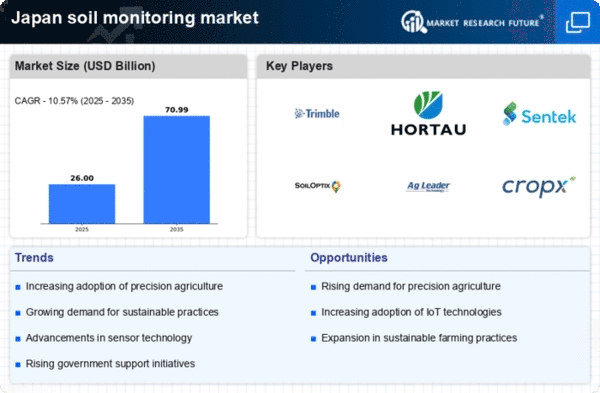Rising Demand for Food Security
Japan's increasing population and urbanization are contributing to a heightened demand for food security, which in turn is influencing the soil monitoring market. As agricultural land becomes more limited, efficient soil management practices are essential to maximize productivity. The soil monitoring market is positioned to benefit from this trend, as farmers seek to utilize data-driven insights to enhance crop yields. Market analysts suggest that the demand for soil monitoring solutions could increase by 18% in the next five years, driven by the need for sustainable food production methods.
Increasing Awareness of Soil Health
There is a growing awareness among Japanese farmers regarding the importance of soil health in sustainable agriculture. This awareness is driving the soil monitoring market as farmers seek to optimize soil conditions for better crop production. Educational initiatives and workshops are being organized to inform farmers about the benefits of soil monitoring technologies. As a result, the adoption rate of soil monitoring tools is expected to rise significantly, with estimates suggesting a potential increase of 20% in usage over the next five years. This trend indicates a shift towards more informed agricultural practices, thereby enhancing the soil monitoring market.
Technological Advancements in Soil Monitoring
The soil monitoring market in Japan is experiencing a surge due to rapid technological advancements. Innovations such as IoT sensors, drones, and satellite imagery are enhancing soil data collection and analysis. These technologies enable farmers to monitor soil health in real-time, leading to improved crop yields and resource management. The integration of AI and machine learning in soil monitoring systems is also gaining traction, allowing for predictive analytics that can forecast soil conditions. As a result, the market is projected to grow at a CAGR of approximately 12% from 2025 to 2030, indicating a robust demand for advanced soil monitoring solutions in Japan.
Regulatory Framework and Environmental Policies
The regulatory framework in Japan is increasingly favoring sustainable agricultural practices, which is positively impacting the soil monitoring market. Government policies aimed at reducing chemical usage and promoting organic farming are encouraging farmers to adopt soil monitoring technologies. The Ministry of Agriculture, Forestry and Fisheries has introduced guidelines that support the use of precision agriculture tools, including soil monitoring systems. This regulatory support is likely to drive market growth, with projections indicating a potential market expansion of 15% by 2030 as more farmers comply with environmental standards.
Investment in Agricultural Research and Development
Investment in agricultural research and development is playing a crucial role in advancing the soil monitoring market in Japan. Government and private sector funding are being directed towards innovative soil monitoring technologies and practices. Research institutions are collaborating with agricultural stakeholders to develop solutions that address specific soil challenges faced by Japanese farmers. This investment is expected to yield new products and services that enhance soil monitoring capabilities. Analysts predict that the market could see a growth rate of 10% annually as these innovations are commercialized and adopted by the agricultural community.























Leave a Comment